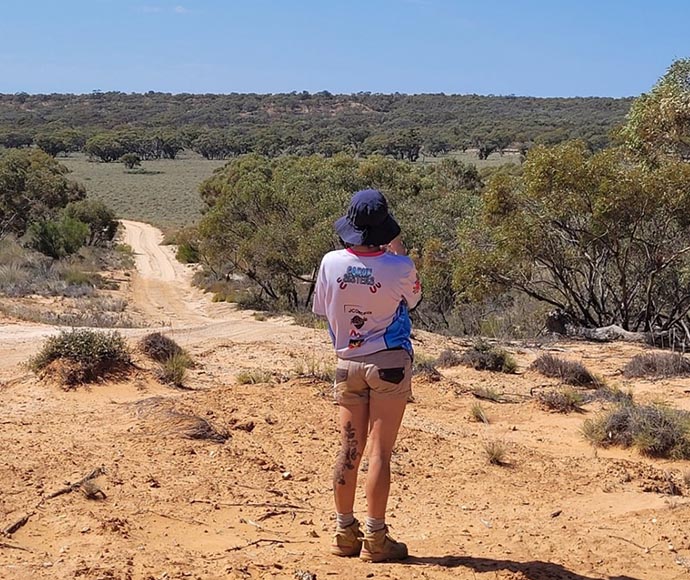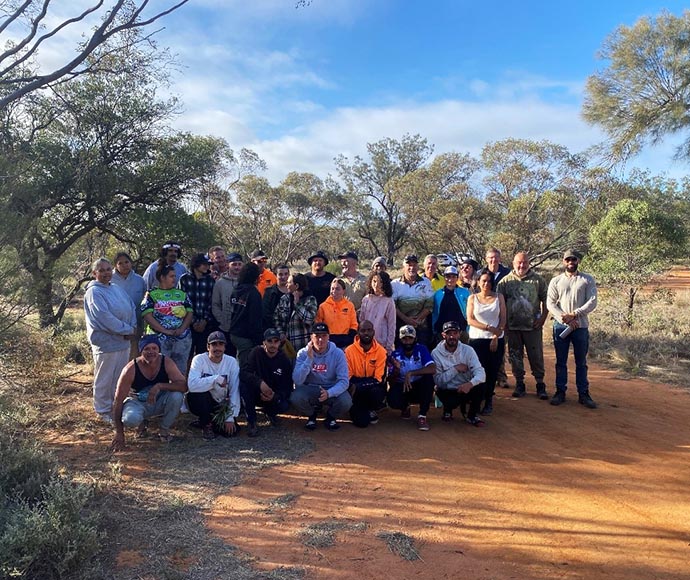Caring for Country at Rick Farley Reserve
Cultural scientists build capacity for Aboriginal expertise in caring for Country at Rick Farley Reserve.
Aboriginal rangers on NSW South Coast have embedded their cultural learnings on how to care for Country with a trip to a sacred Aboriginal site. The 15 months of training in land stewardship culminated at Rick Farley Soil Conservation Reserve in September 2023.
The trip was led by cultural scientist and Aboriginal Elder Graham Moore, who works in the Conservation and Restoration Science Branch within the Science, Economics and Insights Division.

A reward for committed work for Country
'We offered this trip as part of their training which included how to use drones and how to conduct cultural burning, understanding Aboriginal culture and practices – training which we did in partnership with the Merrimans Local Aboriginal Land Council,' said Graham.
The 18 rangers, mostly youth, travelled from Bega in the Far South Coast with 5 cultural scientists for the trip to Western New South Wales.
'They had been walking Country and reconnecting to Country on the east coast. They were now going to connect to the western mob and experience an ancient area none of them had seen and understand that where we walk on our own Country – it is still ancient,' he said.
The 5-day trip enabled experiential learning to take hold without lectures and note-taking.
Connecting to Country
The rangers came from Merrimans, Batemans Bay and Bega Local Aboriginal Land Council areas. Cultural Scientist Kerry Avery said the day of arrival was the hardest for them.
'The rangers were lost the first half a day with phones out of range. We had separate campsites for men and women, but sleeping in a swag the first night amongst strangers was uncomfortable for them,' said Kerry Avery, noting that many of them had never travelled beyond the Far South Coast.
Day 2 saw the rangers listening to women cultural scientists' stories ranging from family and culture to malleefowl ethology from Cultural Science Team Leader Mal Ridges.
'Rangers drew their own parallels between nature's drive for longevity and continuation of the species and human behaviour,' said Kerry. Before long, the rangers saw they had insights to contribute, regardless of age, gender or place of birth,' said Kerry.
Cultural monitoring, evaluation and reporting
Kerry and Paris Goolagong (nee Norton) captured responses for cultural monitoring, evaluation and reporting (MER).
'The growth in confidence shone through in just a couple of days with young people willing to communicate across generations, gender and cultural background.'
'They discovered knowledge they brought with them of native species of plants and animals that they could share, even if they were 18 years old and had never left their homeland in Bega.'
They were happy to learn about another Country, which they could take back to their own land. They were surprised to learn first-hand that the reserve had once been a place of trade and exchange. The landscape of Rick Farley is densely dotted with artefacts over 17,000 years old, which were revealed as the Willandra Lakes region dried up.
'They found a pink polished quartz that could not have come from the region,' said Kerry.
Ceremony
Cultural Scientist Amanda Close said a critical part of the trip was the Yungadhu (mallee fowl) ceremony led by Elder Mick Kelly, where all the experiences came together for the group.
'Everyone sat in one spot and sat in stillness and with purpose. There was a discussion of role and responsibility and how people place themselves for whatever purpose they see.
'It was a safe space and it was important having role models, to discuss change as we get older, our roles in life and support for one another,' she said.
'Sights, smells, textures whether it's in ceremony or in exposure to cultural practices in a place like this, with the explanation of significance, are transformative experiences,' explained Graham.
'They might be sitting listening to the wind through the belah tree and be transported by memory to hear the sound of Bega's running rivers; they won't forget the connection between time, space and people,' he said.
Next steps
As a result of the trip, interest has grown from Ulladulla to Nowra, for other rangers to connect more deeply to Country.
'The cultural scientists' work has helped to embed the importance of Caring for Country in our rangers and built confidence around how to go about doing this,' said Fire and Cultural Science Senior Team Leader Greg Summerell.
'We will continue to grow these pathways for better management of fire and landscapes in New South Wales as part of the recommendations to the 2019-20 Bushfire Inquiry.'
